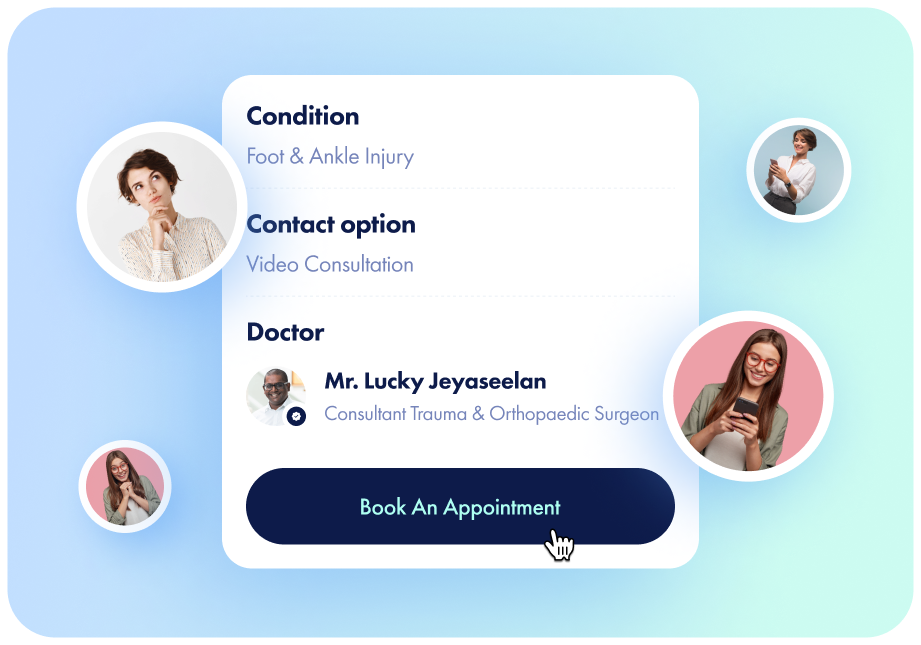
Conveniently reserve your spot with just a few clicks through our easy-to-use online booking system.

Angioplasty is a minimally invasive procedure that opens blocked coronary arteries. A thin tube with a balloon is inserted into the artery, and the balloon is inflated to widen the blockage. A stent (tiny mesh tube) is often placed to keep the artery open.
You are not required to provide a referral letter from your doctor or GP.
Start a visit quickly and discreetly whenever works best for you.
Our doctors review symptoms, prescribe treatments if needed.
Proceed with your healthcare journey as you wish. You're in control.
You control medical records, access anytime.
Depending on the severity of your condition and other health factors, the angioplasty might require an overnight stay. Your doctor will discuss everything you need to know before the procedure.
To prepare for the procedure you may be asked not to eat or drink, usually starting the night before. The vascular or endo-vascular surgeon will provide specific instructions about fasting based on your situation.
On the day, wear comfy clothing and leave your jewellery and valuables at home. You should arrange for someone to drive you home after the procedure, as you might not be allowed to drive immediately, due to the effects of sedation or anaesthesia.
Сontact us to schedule an appointment or learn more
Conveniently reserve your spot with just a few clicks through our easy-to-use online booking system.
Have a question or request? Drop us a message, and our team will get back to you promptly.
Feel free to give us a call, and our friendly staff will be glad to assist you over the phone.
During an angioplasty, the vascular surgeon inserts a thin, flexible tube called a catheter into an artery (usually in the groin area or wrist) and guides it to the affected artery using imaging techniques such as X-ray fluoroscopy. At the tip of the catheter, there's a small balloon which is then inflated in the narrowed area, to compress the plaque against the artery walls and widen the vessel to improve blood flow.
If the narrowing of the vessel is significant and balloon dilation is not sufficient, the doctor will implant a stent to keep the artery open. This stent helps keep the artery open and prevents it from collapsing or narrowing again after the procedure. Stents can be made of metal or coated with medication to prevent blockages from reoccurring.
Recovery after an angioplasty is generally quick for most patients. However, the specific recovery process can vary based on each individual’s health conditions, the type of angioplasty performed, and other factors. Once discharged, it's essential to get plenty of rest for the first few days following the procedure. Avoid strenuous activities, heavy lifting, or intense exercise. Light activities like walking are often encouraged to aid circulation and promote healing.
You'll also need to take care of the insertion site, the area where the catheter was inserted. Follow your doctor's instructions on how to keep the area clean and watch out for any signs of infection, such as redness, swelling, or discharge. It's important to follow all post-procedure instructions provided by your consultant. Contact your doctor immediately if you experience severe chest pain, shortness of breath, bleeding, signs of infection, or any other concerning symptoms during your recovery.
Adopting a heart-healthy lifestyle is crucial for recovery and long-term well-being. This includes maintaining a balanced diet, regular exercise (as advised by your doctor), quitting smoking if applicable, managing stress, and adhering to any recommendations regarding medications.
From Home or Face to Face, all at your convenience
Schedule a Video Consultation or a Face-to-Face appointment at your convenience by using our online booking system.
Schedule a Video Consultation or a Face-to-Face appointment at your convenience by using our online booking system.
Your dedicated Specialist Doctor will provide you with personalized treatment, tailoring it to your specific needs, and may include necessary medication.
If you or a loved one are experiencing symptoms related to compromised blood flow or have been diagnosed with arterial blockages, explore the comprehensive vascular services available at our London clinic. Speak to one of our consultant vascular surgeons and start your treatment without the wait.














